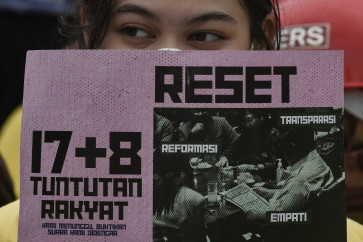Popular Reads
Top Results
Can't find what you're looking for?
View all search resultsPopular Reads
Top Results
Can't find what you're looking for?
View all search resultsWeekly 5: Traditional games surviving the test of time
JPSomehow, amid the glut of consoles, apps and other electronic distractions, certain traditional local games have kept their torches alive
Change text size
Gift Premium Articles
to Anyone
JP
Somehow, amid the glut of consoles, apps and other electronic distractions, certain traditional local games have kept their torches alive. Cecep Imansyah of the Hong community, which acts to preserve traditional games, said that the community had recorded more than 1,000 traditional games spanning from Aceh to Papua.
'Only about 20 percent of them survive and are still played, mostly in villages,' he said during a traditional games festival at the National Museum in Central Jakarta recently.
Most traditional games, he revealed, were on the brink of extinction for simple reasons.
'[Adults] don't pass on traditional games to their children. The lack of data and public space also contribute to the issue,' he said.
Here are five traditional games that enliven today's children's lives as they did their ancestors':
Hide and seek
Hide and seek, known locally as petak umpet, remains a favorite among children, even in a modern megalopolis like Jakarta. Petak umpet's enduring popularity is probably down to its simplicity; it requires no equipment, and can be played in any space, large or small. The game can also be given tailor-made twists. Raisa, 6, who lives in East Jakarta, said that she often played petak jongkok, or squat and seek, in which a player is 'safe' if he or she squats. The goal is the same: to race to touch the base. In the old days'particularly in villages ' children especially loved to play hide and seek during the full moon.
Kite-flying
Layang-layang, or kites, remain popular, particularly among boys. In the kampung, flying kites can be a competition, with each kite flyer fighting to cut the opponent's kite. Kite-flying is relatively simple, but requires wind and enough space. With limited open public space in the capital city, some kite lovers gravitate to public-school playing fields to fly their kites after school hours.
The Kite Museum in South Jakarta offers visitors the chance to enjoy dozens of types of kites ' traditional and modern ' with various shapes like fish, traditional houses, birds and dragons.
Marbles and knucklejacks
Locally called kelereng, marbles are popular among boys, while bola bekel, or knucklebones, are preferred by girls.
The boys compete to collect as many marbles as possible by shooting opponents' marbles, with any struck marbles taken by the shooter.
Meanwhile, in Knucklejacks, the winner is the first player to successfully complete a prescribed series of throws, which, though similar, differ widely in detail. The simplest throw consists in tossing up one stone, the jack, and picking up one or more from the table while it is in the air. This continues until all five stones have been picked up.
Torblade
Traditional torblade, which is usually made of bamboo, is said to be one of the oldest traditional games in the country. In Jakarta, people usually know torblade as gangsing, or gasing in other parts of Indonesia. Though bamboo-made gasing is quite rare nowadays, it can be found at nostalgic-mementro vendors like Cemal Cemil.
Rope jump
Commonly played by girls, the rope is usually in fact a length of rubber, prized for its flexibility.
Ideally, the game is played by at least three players, two of whom are tasked with holding the rope. The player jumps over the low rope without her body touching it. The height of the rope increases as the player succeeds and is allowed to touch the rope. The player can also use her hand to lower the rope.
Another way of playing it is by swinging the rope while the player jumps whenever the rope touches the ground. As the game proceeds, the player may only jump on one foot.










